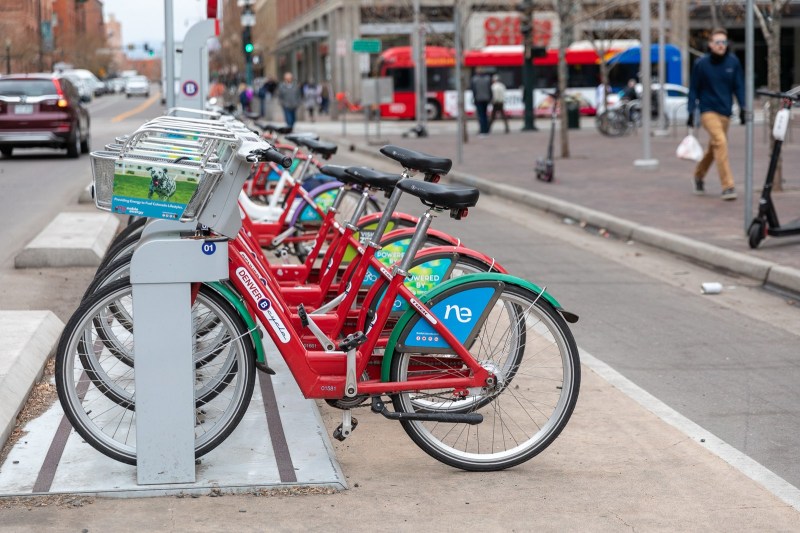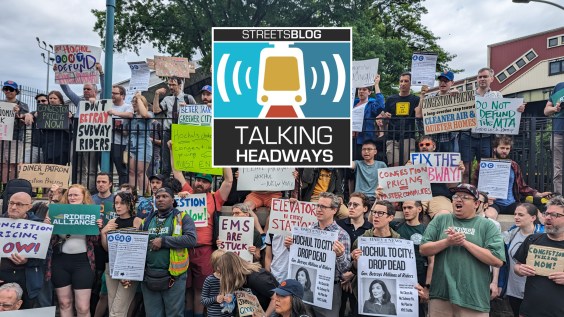Denver B-cycle bike share is shutting down and won’t be replaced with something new until next year — bad timing that will almost certainly add more car trips to the city’s already congested streets.
B-cycle will shut down Jan. 30, according to the nonprofit that operates it. The city will also end its electric scooter permit program, replacing it with a system where scooter and shared bike providers will compete for a city contract.
The city will choose one or more vendors to operate all shared bikes and scooters, a decision that will be made this summer, according to the Department of Public Works, which will make the formal announcement this morning. But getting a new bike share system up and running could take several more months and the lengthy gap in service might push B-cycle users like Matt Castelli and his wife into buying a car.
“Not having B-cycle, we would need to get our own bikes or a car,” he said after returning a shared bike to the docking station in front of Union Station yesterday afternoon. He and his wife chose their home in part for its proximity to their downtown jobs, which has allowed them to cut car trips. “We use B-cycle every day. We ride it to happy hour, the rock climbing gym, or sometimes to the grocery store. We use it, in part, for only having one car.”
Denver’s B-cycle bikes and docking stations need to be replaced. Many date to when the system was launched in 2009, according to Mike Pletsch, executive director of Denver Bike Sharing, the nonprofit that runs B-cycle. But the organization doesn’t have the money to replace the equipment or renew its contract with Trek, the bicycle manufacturer that developed the system.
“The continued aging of the system and the cost to work with B-cycle is too high for us,” he said. “The funding is just not there to do it.”
The organization’s 2018 budget totaled $1 million, according to its annual report. The city provided it with $800,000 this year, and about half of that was dedicated to a program that handed out 5,280 free annual passes.
When asked why Denver Bike Sharing and the city didn’t arrange for a seamless transition between the old equipment and a new system, Pletsch said he tried.
“The ball didn’t get dropped. There are just a lot of factors and we’re not going to get into any finger-pointing,” he said. “It’s an unfortunate situation. We’re very sorry about that.”
B-cycle ridership has been falling steadily since its peak in 2014. The system’s riders took 377,000 trips that year compared to 305,000 in 2018, a 19-percent decline, according to the annual report. The decrease in riders corresponds roughly with the rise of ride-hail services like Uber and Lyft, and the arrival of dockless scooters and bikes last year.
But Denver’s bike share system has never had the high number of stations needed to reach high ridership levels, like those in Paris, New York or Mexico City. According to the National Association of City Transportation Officials, successful systems provide 28 stations per square mile. Denver B-Cycle had just five stations per square mile in 2014.
“We’ve got 89 stations currently and there certainly needs to be more,” said Pletsch. Those docking stations are spread out over seven neighborhoods and host the system’s 716 bikes.
But Piep van Heuven of Bicycle Colorado pointed to the program’s success.
“With over 5 million miles ridden, they’ve made 11 trips to the Moon, and back,” she said.
She also noted that Denver Bike Share is scrambling to team up with a different bike manufacturer before it bids on the city contract. Such a partnership could provide new technologies like dockless electric-assist bikes.
“Imagine what they can do with an upgrade to the latest in technology,” she said.
The city’s new program could bring some order to its dockless mobility program.
Under the new system, companies like Bird, Spin, Lime, Lyft and Jump — along with Denver Bike Share — will need to submit proposals to the city. Next summer, one or more organizations will win the right to operate all micro-mobility devices in the city.
The contract could keep companies from suddenly raising prices, pulling out of Denver, or dumping their scooters in the middle of pedestrian thoroughfares.
In August, Streetsblog documented large numbers of Bird scooters repeatedly placed in the middle of walkways at Union Station.
The companies have also suddenly pulled out of cities. Lime removed its electric bikes from Denver this spring. Lyft did the same with its scooters in six cities this week. And Jump took out its e-bikes from two cities in September.
Jump also jacked up its prices in Denver by 67 percent in June, one month after Uber, its parent company, faced an underwhelming IPO on the New York Stock Exchange.
Considering the volatility of for-profit scooter and e-bike companies, Pletch hopes his nonprofit’s relatively boring and nearly decade-long track record will give it an edge as the city awards its contract.
“We will go after the request for proposal and trust that the city will make the best decision,” he said. “We certainly look forward to getting back out there and serving the community.”






